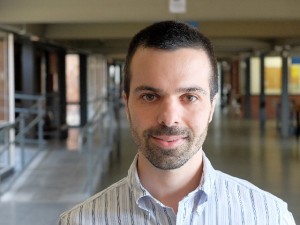“Being part of a growing research group and university is very exciting and inspiring for my career”
 Federico Tadei joined the Department of Economic History, Institutions, Politics and Global Economy at the Universitat de Barcelona School of Economics in September 2016 as a postdoctoral researcher. Previously, he had been a European Research Council (ERC) postdoctoral research fellow at the Bocconi University. He obtained his PhD from the California Institute of Technology (Caltech) in 2014, with a dissertation on “Extractive Institutions in Colonial Africa”. In this interview he talks about his experience so far and his expectations about the future.
Federico Tadei joined the Department of Economic History, Institutions, Politics and Global Economy at the Universitat de Barcelona School of Economics in September 2016 as a postdoctoral researcher. Previously, he had been a European Research Council (ERC) postdoctoral research fellow at the Bocconi University. He obtained his PhD from the California Institute of Technology (Caltech) in 2014, with a dissertation on “Extractive Institutions in Colonial Africa”. In this interview he talks about his experience so far and his expectations about the future.
It’s already been nine months since you joined the UB School of Economics as a postdoctoral researcher. What do you think of the experience thus far?
My experience at the UB School of Economics has been excellent. I really enjoy the stimulating and collaborative research environment, the interactions with colleagues and students, and the possibility of being part of a growingly international university.
What can you tell us about the research you are carrying out at the UB School of Economics?
My work has so far focused on the political economy of development of Sub-Saharan Africa within a historical perspective. I have combined game theoretic models, original data collected from primary sources, and econometric techniques to understand how historical events shaped development paths in African countries, with a particular focus on trade and inequality in the long-run.
What are your main fields of interest?
My research interests are mainly in the fields of Economic History and Development Economics.
What courses do you teach at the Faculty of Economics and Business?
I teach courses in Economic History and Economic Growth in the MSc in Economics, in addition to a Research Methods class co-taught in the PhD in Economic History. A common theme of these classes is to understand which factors can account for economic growth in the long-run and what can explain the huge differences in income that we observe today between poor and rich countries.
What do you enjoy most about teaching UB students?
I really enjoy teaching UB students. In my experience, the level of interest and participation in class discussions and lectures is quite high, which helps creating a motivating teaching and learning environment for students and lecturer alike. I find being able to teach capable and motivated students one of the most rewarding part of my job as a faculty member.
You had to go through a competitive selection process before being offered a place at the Department of Economic History, Institutions, Politics and Global Economy. How was your experience as an Economics Job Market candidate?
I had an excellent experience as a job market candidate. I found the selection committee to be very professional and welcoming through the entire process from the first interview to the campus visit. In addition, they have always been very available in providing all the information needed to make an informed decision to join the University of Barcelona.
Did you ever imagined yourself being a postdoc researcher and assistant professor at the University of Barcelona?
As an economic historian, I was aware of the Department of Economic History of the University of Barcelona as one of the few departments with a focus on my discipline of specialisation. For this reason, the idea of working here was very appealing to me.
What do you expect from your postdoc experience at the University of Barcelona?
I find the possibility of being part of a growing research group and university very exciting and inspiring for my career. I expect to contribute to this process, learning from colleagues and students, and strengthen my skills both as a researcher and a teacher.
Do you think that Barcelona is a hub for research and teaching in Economics?
I think that the University of Barcelona is currently a good centre for economic research and teaching. From what I have seen so far, the UB School of Economics seems to be on an uptrend and, if this process continues in the future, it has the potential to reach even higher international standards.
Recent news
- Four researchers of the UB School of Economics are listed in the 2% of the world’s most influential scientists
- The second edition of the UB School of Economics Young Researchers Meeting highlighted the excellence of the research done in the field of Economics at the UB
- How the adoption of robots has influenced global sourcing activities among Spanish manufacturing firms
- A Closer Look at the MSc in Economics Class of 2025
- Call for expressions of interest for Assistant Professor positions
- A recent UB study analyzes the environmental and economic impact of flight ticket taxes in Europe
- Would you like to join us for a coffee with researchers from the Faculty?
- UB School of Economics is recruiting two tenure-elegible lecturers
- Call for expressions of interest: PhD Fellowships in Economics

Sorry, the comment form is closed at this time.